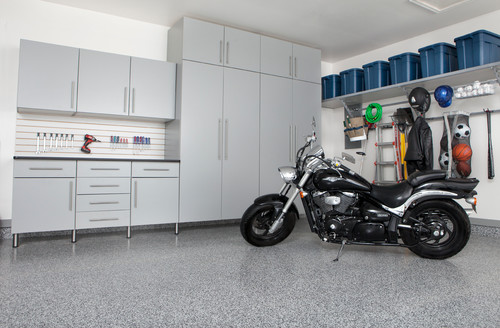If you’re considering a garage renovation, there’s nothing like a fresh coat of paint and a clean floor to get you started. But if your garage floors are cracked, stained, and dirty, you may want to consider a coated floor, or modular garage flooring.
At Strickland’s, we’re happy to offer custom organization and storage solutions as well as professional flooring for your garage. So, which should you choose: coated or modular garage flooring? Here’s our guide.
Coated vs. Modular Garage Flooring
What will it look like?
- Coated: For a clean, smooth, and well-polished look, you can’t go wrong with an epoxy or polyaspartic coated floor. While epoxy floors are only available in a few color selections, polyaspartic floors come with multiple color and design options.
- Modular: Available in many different colors, modular garage floor tiles provide a high-tech, textured look ideal for workspaces and auto shops. Modular tiles can also be installed in unique patterns, such as a checkerboard floor with borders for your vehicles.
- Your Takeaway: It all depends on the look and style you’re going for. At Strickland’s, our designers will happily help you choose the best aesthetic for your garage space.
How much time will it take?
- Coated: Epoxy floors can be a real time commitment. If your garage floors have existing cracks, holes, or damage, they’ll need to be repaired first. Then, epoxy flooring requires days of meticulous prep and layers upon layers which take time to dry — and can release toxic fumes. While you’ll have to step away from your garage for a while if you want epoxy floors, polyaspartic floors take just one day to install. (You can walk on them three hours later, and drive on them after 24 hours).
- Modular: With a patented locking system, modular flooring clicks into place in as little as a few hours.
- Your Takeaway: If time is of the essence, go for modular or polyaspartic flooring. But if you’re willing to wait and your garage is well-ventilated, consider an epoxy flooring solution.
How long will my garage flooring last?
- Coated: A perfectly-installed epoxy coating can protect your garage floor from moisture, stains, and some chemicals, though it may fail over time. Polyaspartic flooring, on the other hand, is less susceptible to damage and less likely to stain from spills or hot tires. While expensive, coated flooring may increase your home’s resale value.
- Modular: Comprised of a durable copolymer built to handle the weight of very heavy vehicles, modular garage floor tiles are generally more chemically-resistant compared to coated flooring. Because modular flooring is so easy to remove, if you ever relocate, you could just take your investment with you!
- Your Takeaway: While both coated and modular flooring are attractive options, modular flooring is generally longer-lasting and can move with you. Epoxy and polyaspartic flooring, on the other hand, can make for smart investments — especially if you’re considering selling your home soon.
How much upkeep does it require?
- Coated: Smooth and simple, coated flooring is easy to clean with a quick sweep and mop, but grease stains can require some serious scrubbing.
- Modular: Available with an open-rib construction, modular tile flooring for garages drains spills, ice, and more, effectively protecting your space from mold and mildew over time. If your garage gets really dirty, the modular construction also allows you to hose off your flooring for quick clean-up.
- Your Takeaway: If your garage is going to get dirty, or you’re concerned about stains, opt for modular flooring.

Your Custom Garage Flooring
Whether you’re leaning towards coated garage floors or daydreaming about the endless options you’ll have with modular garage tiles, we’ll help you design and install your dream garage flooring at Strickland’s. Ready to get started? Give us a call or visit our showroom to see and test our garage flooring for yourself.

